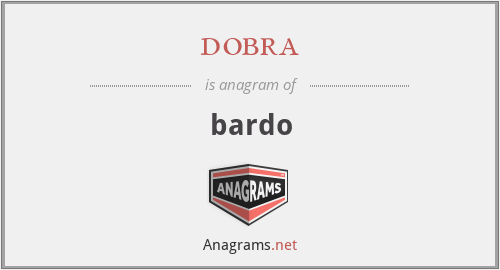What anagrams are available for bardo?
This page is about an anagram for the word dobra that can be used in word games, puzzles, trivia and other crossword based board games.
dobra
Translation
Find a translation for dobra in other languages:
Select another language:
- - Select -
- 简体中文 (Chinese - Simplified)
- 繁體中文 (Chinese - Traditional)
- Español (Spanish)
- Esperanto (Esperanto)
- 日本語 (Japanese)
- Português (Portuguese)
- Deutsch (German)
- العربية (Arabic)
- Français (French)
- Русский (Russian)
- ಕನ್ನಡ (Kannada)
- 한국어 (Korean)
- עברית (Hebrew)
- Gaeilge (Irish)
- Українська (Ukrainian)
- اردو (Urdu)
- Magyar (Hungarian)
- मानक हिन्दी (Hindi)
- Indonesia (Indonesian)
- Italiano (Italian)
- தமிழ் (Tamil)
- Türkçe (Turkish)
- తెలుగు (Telugu)
- ภาษาไทย (Thai)
- Tiếng Việt (Vietnamese)
- Čeština (Czech)
- Polski (Polish)
- Bahasa Indonesia (Indonesian)
- Românește (Romanian)
- Nederlands (Dutch)
- Ελληνικά (Greek)
- Latinum (Latin)
- Svenska (Swedish)
- Dansk (Danish)
- Suomi (Finnish)
- فارسی (Persian)
- ייִדיש (Yiddish)
- հայերեն (Armenian)
- Norsk (Norwegian)
- English (English)
Definition
What does bardo mean?
- Bardo
- In some schools of Buddhism, bardo (Classical Tibetan: བར་དོ་ Wylie: bar do) or antarābhava (Sanskrit, Chinese and Japanese: 中有, romanized in Chinese as zhōng yǒu and in Japanese as chū'u) is an intermediate, transitional, or liminal state between death and rebirth. The concept arose soon after Gautama Buddha's death, with a number of earlier Buddhist schools accepting the existence of such an intermediate state, while other schools rejected it. The concept of antarābhava, an intervening state between death and rebirth, was brought into Buddhism from the Vedic-Upanishadic (later Hindu) philosophical tradition. Later Buddhism expanded the bardo concept to six or more states of consciousness covering every stage of life and death. In Tibetan Buddhism, bardo is the central theme of the Bardo Thodol (literally Liberation Through Hearing During the Intermediate State), the Tibetan Book of the Dead, a text intended to both guide the recently deceased person through the death bardo to gain a better rebirth and also to help their loved ones with the grieving process.Used without qualification, "bardo" is the state of existence intermediate between two lives on earth. According to Tibetan tradition, after death and before one's next birth, when one's consciousness is not connected with a physical body, one experiences a variety of phenomena. These usually follow a particular sequence of degeneration from, just after death, the clearest experiences of reality of which one is spiritually capable, and then proceeding to terrifying hallucinations that arise from the impulses of one's previous unskillful actions. For the prepared and appropriately trained individuals, the bardo offers a state of great opportunity for liberation, since transcendental insight may arise with the direct experience of reality; for others, it can become a place of danger as the karmically created hallucinations can impel one into a less than desirable rebirth.Metaphorically, bardo can be used to describe times when the usual way of life becomes suspended, as, for example, during a period of illness or during a meditation retreat. Such times can prove fruitful for spiritual progress because external constraints diminish. However, they can also present challenges because our less skillful impulses may come to the foreground, just as in the sidpa bardo.
Embed
Citation
Use the citation below to add this anagram to your bibliography:
Style:MLAChicagoAPA
"dobra." Anagrams.net. STANDS4 LLC, 2024. Web. 11 May 2024. <https://www.anagrams.net/term/1439726>.



Discuss this bardo anagram with the community:
Report Comment
We're doing our best to make sure our content is useful, accurate and safe.
If by any chance you spot an inappropriate comment while navigating through our website please use this form to let us know, and we'll take care of it shortly.
Attachment
You need to be logged in to favorite.
Log In